|
|
|
Sort Order |
|
|
|
Items / Page
|
|
|
|
|
|
|
| Srl | Item |
| 1 |
ID:
073692
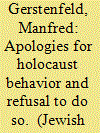

|
|
|
| 2 |
ID:
074716
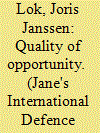

|
|
|
| 3 |
ID:
147717
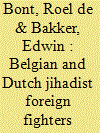

|
|
|
|
|
| Summary/Abstract |
In recent years, Belgium and the Netherlands have been confronted with relatively many citizens or residents who have traveled to Syria and Iraq to join and fight with jihadist groups — 388 Belgian and 220 Dutch as estimated by the respective authorities. This article provides an overview of the phenomenon of jihadist foreign fighters in the Low Countries, analyzing their characteristics, motivations, and roles in the war in Syria and Iraq. It compares the Belgian and Dutch cases, focusing on key aspects, such as age, sex, and geographical and socioeconomic background.
|
|
|
|
|
|
|
|
|
|
|
|
|
|
|
|
| 4 |
ID:
138822
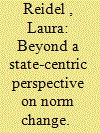

|
|
|
|
|
| Summary/Abstract |
This article argues that constructivist literature on norm diffusion could benefit from using a multilevel governance perspective. The case study is a retreat from the multicultural approach to governing state-minority relations in liberal democratic states, focusing on Canada and the Netherlands. It argues that, although actors at the national level may be retreating from the norms underlying this multicultural approach, this is not true of the substate and suprastate levels. Instead, in both countries, there is evidence of work at these levels to maintain these norms.
|
|
|
|
|
|
|
|
|
|
|
|
|
|
|
|
| 5 |
ID:
143287
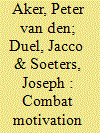

|
|
|
|
|
| Summary/Abstract |
This research note presents the findings of a survey study among veterans from the Netherlands armed forces who participated in operations since the Second World War. The aim of the study is to reveal the veterans’ experiences with respect to their combat motivation—or lack thereof—and actual participation in combat actions. The data demonstrate that over time the degree of combat motivation has increased. The data also demonstrate that those who participated in combat actions and were motivated to do so are generally positive about operational and social–psychological aspects of the organization and its surroundings. The implications of these findings are discussed.
|
|
|
|
|
|
|
|
|
|
|
|
|
|
|
|
| 6 |
ID:
074528
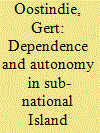

|
|
|
| 7 |
ID:
164367
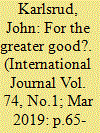

|
|
|
|
|
| Summary/Abstract |
The usual suspects of middle power internationalism—small and middle powers such as Canada, Denmark, Norway, the Netherlands, and Sweden—have all contributed to the UN peacekeeping mission in Mali (MINUSMA). This article argues that while these and other Western countries' contributions to MINUSMA may still be characterized as investments into UN peacekeeping reform and a rule-governed world order, the liberal underpinnings of that commitment are withering. Instead, these countries seek to enhance their own status. This is done by gaining appreciation for their contributions, primarily from the US; strengthening their bids for a non-permanent seat on the UN Security Council; and self-interested contributions to reform UN peacekeeping by efforts to enable it to confront violent extremism and terrorism. Paradoxically, the article concludes, when moving the UN towards counterterrorism and weakening the legitimacy of the organization, Western states undermine a cornerstone of their own security.
|
|
|
|
|
|
|
|
|
|
|
|
|
|
|
|
| 8 |
ID:
162975
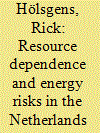

|
|
|
|
|
| Summary/Abstract |
Even though the Netherlands was well-endowed with domestic resources, but has also been dependent on foreign supplies. From 1850 onward, consumption of imported coal grew quickly. At the turn of the century, politicians became uneasy about this growing dependence. In 1901 the state-owned State Mines were established to exploit domestic coal and production gradually grew. In the interwar period the Netherlands became almost self-sufficient in coal. After WWII, it experienced a fast transition to oil dependence. In 1959 natural gas was discovered in Groningen by Shell and Esso, and the government forced them to join forces with the State Mines in the exploitation. The fast introduction of natural gas diminished the role of coal, but dependence on imported oil remained. The oil crisis triggered a reorientation of the energy policy, with emphasis on diversification in terms of resources and supplier countries. The export of natural gas was reconsidered. Shifts in energy resource consumption in the Netherlands in the past 150 years, were closely related to perceptions of risks. The Dutch government was strongly involved in previous energy transitions and will also have an important role to play in the transition to renewable energy.
|
|
|
|
|
|
|
|
|
|
|
|
|
|
|
|
| 9 |
ID:
159886
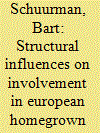

|
|
|
|
|
| Summary/Abstract |
This article empirically assesses the applicability of structural-level hypotheses for involvement in terrorism within the context of European homegrown jihadism. It uses these hypotheses to study how structural factors influenced involvement in the Dutch “Hofstadgroup.” Structural factors enabled the group’s emergence and its participants’ adoption of extremist views. They also motivated involvement in political violence and a shift in some participants’ focus from joining Islamist insurgents overseas to committing terrorism in the Netherlands. Finally, structural factors precipitated an actual terrorist attack. No support is found for the frequently encountered argument that discrimination and exclusion drive involvement in European homegrown jihadism. Instead, geopolitical grievances were prime drivers of this process.
|
|
|
|
|
|
|
|
|
|
|
|
|
|
|
|
| 10 |
ID:
161093


|
|
|
|
|
| Summary/Abstract |
This article looks into the meaning of Tahrir Square before, during, and after the January 25 revolution. We employ Lefebvre's conceptual triad of space to understand how space is not merely a physical form, but also the product of relations between natural and social objects in this space. To understand how these relations changed dramatically after January 25, we will draw on Sewell's insight into how space is a constituent aspect of contentious politics. We discuss the way in which the political space of Tahrir Square went through distinct phases during and after the Egyptian revolution, from counter-space, to eventually a change in the conceived space of Tahrir Square, but not according to the principles of the newly created lived space during the 18 days.
|
|
|
|
|
|
|
|
|
|
|
|
|
|
|
|
| 11 |
ID:
187495
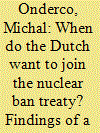

|
|
|
|
|
| Summary/Abstract |
Even if most European countries have not yet joined the Treaty on the Prohibition of Nuclear Weapons (TPNW), the treaty has been salient in a number of national settings. In the Netherlands, the TPNW enjoys broad societal appeal, and the Dutch parliament has, on a number of occasions, called on the government to explore options for joining the treaty. In this piece, we empirically study Dutch attitudes toward joining the TPNW. Our findings indicate that a majority of the Dutch would prefer to accede to the TPNW only if nuclear-weapon states or other NATO allies also joined, although unilateral accession received relatively strong support among the youngest respondents, women, and voters supporting the left-wing parties. The most popular option is to join the TPNW at the same time that the nuclear-weapon states do, which seems to be a rather distant prospect in the current international-security environment.
|
|
|
|
|
|
|
|
|
|
|
|
|
|
|
|
|
|
|
|
|